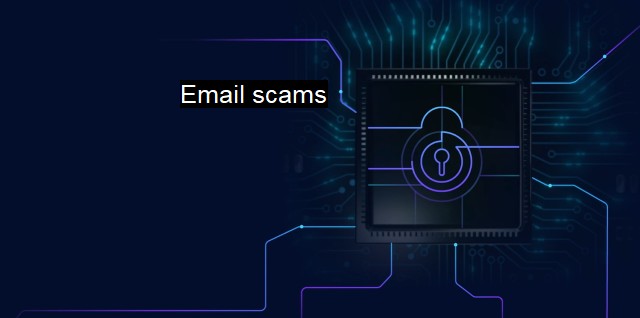What are Email scams?
Rising Threat of Phishing Scams: Protecting Yourself and Your Organization from Sophisticated Cybersecurity Attacks
Email scams, often referred to as phishing, fraudulent emails or spoofing, are cybercrimes that allow malicious individuals or groups to access the sensitive information of unsuspecting victims. These scams are presented as urgent and enticing messages to trick the person into revealing private data, such as usernames, passwords, and credit card details. The information gathered is typically used for unethical purposes such as financial fraud, identity theft, and various forms of cyber exploitation.Email scams have been around almost as long as email itself. As more people became involved in the digital world, cyber threats on this scale became more commonplace. Today, even with advancements in cybersecurity and antivirus software, these scams continue to grow in complexity and sophistication, making them a consistent threat to personal, business, and even governmental digital security.
There are many types of email scams; it is important to know the most common ones. Nigerian 419 scams, lottery scams, and phishing emails from banks, tax agencies, or renowned companies are some of the most frequently encountered. These generally offer some form of a significant monetary reward or threat to safety, to pressure victims into responding promptly without questioning the authenticity of the email.
Email scam operations are often well-structured, with professionals who specialize in various manipulation tactics. As their primary tool, social engineering is exercised. This involves manipulating people into breaking standard security practices. Through carefully worded language and persuasive presentation styles, scammers can build trust and create urgency and fear to motivate victims to divulice their information.
With growing recognition of the threats posed by email scams, cybersecurity has turned its focus to innovative detection and prevention methods. machine learning algorithms and advanced threat-detection systems are being developed. These applications analyze the patterns and characteristics of incoming emails, learning over time the differentiate genuine from fraudulent emails.
At the frontline of detecting these scams is Antivirus software, capable of analyzing the contents of incoming mail, looking out for known virus signatures, malicious URLs, and potential malware-laden attachments. Updated per the newest threats identified, modern antivirus software automatically warns users about suspicious email contents and behaviors which may indicate scam attempts.
Despite the significant strides in cybersecurity and antivirus protection, consumer awareness and vigilance must never be understated when it comes to combating email scams. Cybersecurity professionals suggest multiple best practices to foster a vigilant email culture. These include being cautious of unexpected emails, refraining from clicking on suspicious links, verifying the sender by checking the email address, and familiarizing oneself with standard email formats of legitimate organizations frequently contacted.
Regular antivirus software updates should be maintained, enabling the application with the most recent threat intelligence for optimal protection. For businesses, enforcing a comprehensive cybersecurity policy that addresses email scams and related threats is essential.
With email scams continuously evolving and advancing in sophistication, it is crucial to balance the technical and human aspects of cybersecurity. Strengthening antivirus configurations and promoting a culture of security awareness within any organizational or personal environment will be integral. Despite technology advancement, a vigilant person will always be a crucial line of defense against these persistent cyber threats. Remember, an alert and knowledgeable mind can be as powerful as the most advanced antivirus software. Understanding, recognizing, and resisting email scams is an integral part of defending oneself in the digital age.

Email scams FAQs
What is an email scam?
An email scam is a fraudulent scheme where attackers send emails to deceive individuals into providing sensitive information or money.What are some examples of email scams?
Examples of email scams include phishing scams, advance fee fraud, lottery scams, and business email compromise.How can I protect myself from email scams?
You can protect yourself from email scams by being cautious when opening emails from unknown senders, avoiding clicking on suspicious links or attachments, and using antivirus software to detect and block malicious email content.What should I do if I fall victim to an email scam?
If you fall victim to an email scam, you should immediately change your passwords, contact your bank or credit card company to report any fraud, and report the incident to law enforcement and the relevant authorities. It is also important to educate yourself on common email scams to prevent future attacks.| | A | | | B | | | C | | | D | | | E | | | F | | | G | | | H | | | I | | | J | | | K | | | L | | | M | |
| | N | | | O | | | P | | | Q | | | R | | | S | | | T | | | U | | | V | | | W | | | X | | | Y | | | Z | |
| | 1 | | | 2 | | | 3 | | | 4 | | | 7 | | | 8 | | |||||||